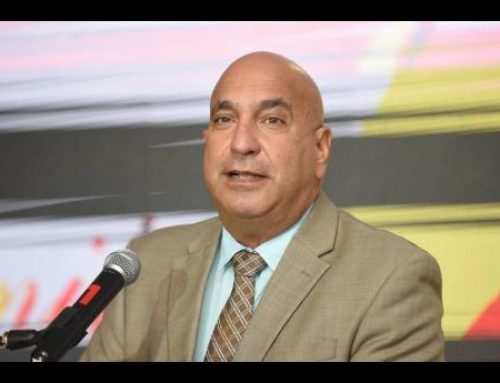May 6, 2015 Written by News Jamaica source
Co-Chair of the Economic Programme Oversight Committee (EPOC), Richard Byles, emphasizes a point as he addresses journalists at EPOC’s monthly press briefingyesterday (May 5), at Sagicor’s head office in Kingston.
KINGSTON, May 6, 2015- The country’s fiscal balance remains in good standing, with the deficit at $7.8 billion at the end of the 2014/15 financial year in March.
The figure is $3.6 billion better than the target of $11.4 billion, and can be credited to the lower interest payments on Government of Jamaica (GOJ) bonds, and cuts in expenditure for the period.
“What this means is that the Government has to borrow less in order to meet all its expenditures including the payment of interest, and so that is good, because it reduces (the) debt build-up,” said Co-Chair of the Economic Programme Oversight Committee (EPOC), Richard Byles.
In giving an assessment of the country’s economic performance as at the end of March, Byles told journalists at EPOC’s monthly press briefing in Kingston yesterday, that the country “comfortably” met the Net International Reserves (NIR) target, which stands at US$2.3 billion, which is almost double the target of US$1.4 billion. “So, we passed that target very comfortably I would say,” he noted.
He said the Government collected 98 per cent of its budgeted tax revenue for March, totalling $52.2 billion of the targeted $53.3 billion in taxes. The shortfall in tax revenues was a result of underperformance from company taxes and General Consumption Tax (GCT) on local purchases.
Mr. Byles told journalists non-compliance remains a serious issue in the collection of taxes. “Non-compliance continues to be a challenge for us, and we probably have not met the target we set because of compliance,” he noted.
“We have to get tougher in respect of tax compliance. We can’t be going down to the wire, every quarter and just barely meeting the tax targets or missing the tax targets and having to recover by cutting on the expenditure side; it can’t continue,” he noted further.
In the meantime, the EPOC Co-Chair says Jamaica is in a good position to receive a positive performance rating from the International Monetary Fund (IMF) despite missing the primary balance target for March.
Set a target of $121.3 billion for the end of the March quarter, Jamaica registered $117.2 billion, a shortfall of $4.1 billion. Byles said it was the first quarter that the country did not meet its primary balance target.
“This country has met the targets seven out of the eight quarters that the IMF has reviewed us. In one quarter, we fall short by $4.1 billion out of $121.3 billion, so that’s less than four per cent short of the target,” he pointed out.
Mr. Byles said the previous successes are important and the IMF team must now “make a decision based on important qualitative judgement that goes beyond just the numbers.”
He said these considerations should include whether the Government remains committed and displays the effort needed to achieve the critical targets under the programme and whether the macroeconomic circumstances that were beyond the control of the authorities are sufficient enough to impact the targets.
“The answer to both is yes…and I think that I can say unequivocally from EPOC’s point of view, the IMF should give the country a waiver based on these two facts,”Mr. Byles asserted.
The IMF team is now in the island conducting its 8th quarterly review of Jamaica’s performance under the Extended Fund Facility (EFF) programme with the multilateral agency.






